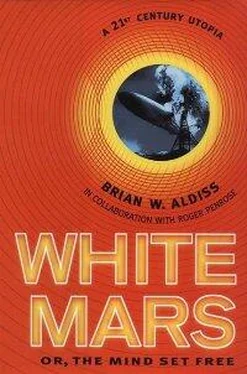Brian Aldiss - White Mars
Здесь есть возможность читать онлайн «Brian Aldiss - White Mars» весь текст электронной книги совершенно бесплатно (целиком полную версию без сокращений). В некоторых случаях можно слушать аудио, скачать через торрент в формате fb2 и присутствует краткое содержание. Год выпуска: 1999, ISBN: 1999, Издательство: Little, Brown UK, Жанр: Фантастика и фэнтези, на английском языке. Описание произведения, (предисловие) а так же отзывы посетителей доступны на портале библиотеки ЛибКат.
- Название:White Mars
- Автор:
- Издательство:Little, Brown UK
- Жанр:
- Год:1999
- ISBN:0-316-85243-0
- Рейтинг книги:5 / 5. Голосов: 1
-
Избранное:Добавить в избранное
- Отзывы:
-
Ваша оценка:
- 100
- 1
- 2
- 3
- 4
- 5
White Mars: краткое содержание, описание и аннотация
Предлагаем к чтению аннотацию, описание, краткое содержание или предисловие (зависит от того, что написал сам автор книги «White Mars»). Если вы не нашли необходимую информацию о книге — напишите в комментариях, мы постараемся отыскать её.
White Mars — читать онлайн бесплатно полную книгу (весь текст) целиком
Ниже представлен текст книги, разбитый по страницам. Система сохранения места последней прочитанной страницы, позволяет с удобством читать онлайн бесплатно книгу «White Mars», без необходимости каждый раз заново искать на чём Вы остановились. Поставьте закладку, и сможете в любой момент перейти на страницу, на которой закончили чтение.
Интервал:
Закладка:
“Why are they not thrown out and deeper causes attended to?
“The answer lies in Popular Subscription, our fourth impediment.”
“Now we’re getting to it,” said Willa. Someone hushed her.
“What it means, Popular Subscription?” asked Aktau Badawi.
“We are conditioned to subscribe to the myths of the age. We hardly question the adage that fine feathers make fine birds, or that young offenders should be shut up in prisons for a number of years until they are confirmed in misery and anger. When witchhunts were the thing, we believed in witches or, if we did not believe, we did not like to speak out, for fear of making ourselves silly or unpopular.
“That fear is real enough, as we see in the instances of rare individuals who dare to speak out against unscrupulous practices in giant pharmaceutical companies or national airlines. Their lives are rapidly made impossible.
“It is Popular Subscription that permits the three other mistaken conceptions we’ve mentioned to beggar our lives.”
“This is no new perception, by the way, Tom,” came the supercilious voice of John Homer Bateson. “The learned Samuel Johnson remarked long ago that the greatest part of mankind had no other reason for their opinions than that they were in fashion.”
I nodded in his direction. “The fifth of our bugbears is, simply, the prevalence of Haves and Have Nots—of the gulf between rich and poor. It has always existed on Earth. Perhaps it always will exist there. Now we have the new long-lived Megarich class, living behind its golden barricades.
“But here—why, on Mars we start anew! We’re all in the same boat. We have no money. We’re all dirt poor and must live at subsistence level. Rejoice that we have escaped from a deep-rooted evil—as deeply rooted as the diseases of which Mary Fangold has spoken.
“We six thousand Crusoes are cut adrift from these miseries—and other miseries you can probably think of. Our lives have been drastically simplified. We can simplify them still further by maintaining a forum here, wherein we shall endeavour to extirpate these errors of perception from our society.
“With a little team work, we can and we will build a perfect and just society. The scientists will do their work. As for the rest of us—why, we have nothing better to do!”
7
Needless to say, my summing up of mankind’s problems did not go undisputed.
At one juncture I was challenged to say what was the point of my lengthy disquisition. I responded, “We are listing some of the preconceptions of which we must rid our minds. There are others to come. While we are here—while we have the chance—I want us to change, change for our own sweet sakes. We have been slaves to the past. We must become people of the long future. We must set the human mind free. Only then can we achieve the greatest things.”
“Such as what?” a YEA called.
“Once you have set your mind free, I will tell you!”
Willa Mendanadum ignored this vital point. She summed up the opposition.
“These hidden stumbling blocks to mankind’s happiness are interesting in their way, but are academic to our present discussion. If we wish to find a means to govern ourselves here, happily and justly, then we must forget about what they are up to on Earth.
“Besides, there are worse and more immediate impediments to our happiness than the ones you mention. If you take my own country, Indonesia, as an example, there you can see a general rule in operation, that big decisions are always made by well-fed people. The well-fed control the ill-fed, and it is in their interest to keep it that way.”
Amid general laughter, as we acknowledged the force of this truism, someone intervened to say, “Then we can make fair decisions here, because we are all ill-fed.”
Another important statement was made by May Porter, who said, “I like the word justice. I dislike the word happiness, always have done. It has a namby-pamby taste in my mouth. It was unfortunate that the American Declaration of Independence included that phrase about the pursuit of happiness being an inalienable right. It has led to a Disneyfied culture that evades the serious meaning—the gravitas, if you like—of existence. We should not speak of maximising happiness, but rather of minimising suffering. I seem to recall from my college days that Aristotle spoke of happiness as being only in accordance with excellence.
“It makes sense to strive for excellence. That is an attainable goal, bringing its own contentment. To strive for happiness leads to promiscuity, fast food, and misery.”
Laughter and general clapping greeted this statement.
As a break from all this debate, which I was not alone in finding exhausting, I did the morning rounds with Arnold Poulsen, the domes’ chief computer technician, after the day’s communal t’ai chi session.
Poulsen was one of the early arrivals on Mars. I regarded him with interest. He was of ectomorphic build, with a slight stoop. A flowing mop of pale yellowish hair was swept back from a high brow. Although his face was lined, he seemed neither young nor old. He spoke in a high tenor. His gestures were slow, rather vague; or perhaps they might be construed as thoughtful. I found myself impressed by him.
We walked among the machines. Poulsen casually checked readings here and there. These machines maintained atmospheric pressure within the domes, and monitored air content, signalling if CO 2or moisture levels climbed unacceptably high.
“They are perfectly reliable, my computers. They perform miracles of analysis in microseconds which would otherwise take us years—possibly centuries,” Poulsen said. “Yet they don’t know they’re on Mars!”
“If you tell them—what then?”
He gave a high-pitched snort. They would be about as emotionally moved as the sands of Mars … These machines can compute but not create. They have no imagination. Nor have we yet created a program for imagination,” he added thoughtfully. “It is because of their lack of imagination that we are able completely to rely on them.”
They could arrive swiftly at the solution of any problem set for them, but had no notion what to do with the solution. They never argued among themselves. They were perfectly happy, conforming to Aristotle’s ancient dictum, as quoted by May Porter, that happiness was activity in accordance with excellence—whereas I felt myself that morning to be baffled and cloudy.
Should I not have allowed myself to mourn in solitude the death of my beloved Antonia, rather than embark on the substitute activity of instigating a suitable Martian way of life?
Against one wall of the computer room stood three androids. The computers would activate them when necessary. They were sent out every morning to polish the surfaces of the photovoltaic plates on which we relied for electricity. They had completed their task for the morning to stand there like butlers, mindlessly awaiting fresh orders.
I remarked on them to Poulsen. “Androids? A waste of energy and materials,” he said. “We had to discover how to create a mechanical that could walk with reasonable grace on two legs—thus emulating one of mankind’s earliest achievements!—but once we’ve done it…”
Pausing, he stood confronting one of the figures. “You see, Tom, they give off no CPS, no CPS. Like the dead … Do you realise how greatly we humans depend on each other’s signals of life? It emanates from our basic consciousness. A sort of mental nutrition, you might say.”
I shook my head. “Sorry, Arnold, you’ve lost me. What is a CPS?”
Poulsen looked at me suspiciously, to see if I was joking. “Well, you give one off. So do I. CPS is Clear Physical Signal. We can now pick up CPSs on what we call a savvyometer. Try it on these androids: zilch!”
Читать дальшеИнтервал:
Закладка:
Похожие книги на «White Mars»
Представляем Вашему вниманию похожие книги на «White Mars» списком для выбора. Мы отобрали схожую по названию и смыслу литературу в надежде предоставить читателям больше вариантов отыскать новые, интересные, ещё непрочитанные произведения.
Обсуждение, отзывы о книге «White Mars» и просто собственные мнения читателей. Оставьте ваши комментарии, напишите, что Вы думаете о произведении, его смысле или главных героях. Укажите что конкретно понравилось, а что нет, и почему Вы так считаете.










